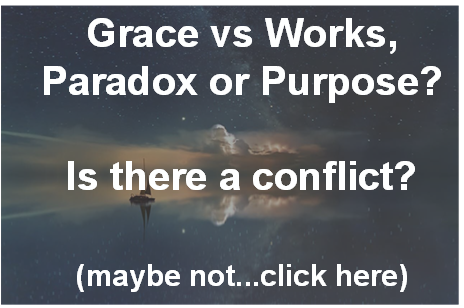The May 2017 post titled Exit Sign by Greg Lauer of A Little Strength has resonated with me or a while I only read it the first time in August or September but it stuck with me. I highly recommend it if you have not read it already.
Since then I have been noodling on the idea of how to evaluate the idea of biblical speculation vs the doctrine of imminence. According to Greg the definition of imminence is this:
Or, more precisely, at no point in time during the Church Age have we ever possessed or will we ever possess the revelation knowledge of Scripture required to confirm the exact date of the Rapture before it occurs, or the existence of a prophetic event that must precede it.
Here's how I interpret Greg’s statements:
- The Rapture can happen at any time.
- God is not constrained by anything that He created that would prevent Him from making the Rapture happen whenever He chooses.
- We don’t have any clues or signs to inform us when it will happen. There is no way we can be certain.
What about biblical speculation (eschatology)? Eschatology by its’ very nature is the process of studying scripture to speculate about what will happen during End Times and of course, End Times includes the Rapture. It is speculation. Now some speculation is better than others. Typically, the closer we get to a subject (the more we learn about it) the closer we get to correctly predicting what will happen.
Speculation is about probabilities. In sports, we might review schedules, statistics, news reports, etc., and speculate that there is an X% chance my favorite professional, college, or high school team will win a game or a championship. ESPN provides a win probability in football that is updated automatically after every play. The win probabilities are not very accurate at the beginning of the games but eventually trend towards the winner as the game goes on.
A better analogy is Meteorology. Weather forecasts are significantly better today than they were 25-30 years ago and they are exponentially more accurate than they were 50 years ago. They are better because the meteorological community has seen a dramatic increase in knowledge and also in their ability to capture and analyze data. According to a recent article by the Associated Press, 5-day forecasts are as accurate in 2017 as 3-day forecasts were in 2005. Also, in 2017 hurricane forecasters predicted a storm's path 72 hours in advance the same level of accuracy as they did at 36 hours in 2005. Predictions are improving as meteorologists collect more data and gain experience with prediction models.
Think about Hurricane Harvey and what it did to Houston recently. Before the storm hit land, meteorologists forecast that many locations in the path of Harvey would have 30 – 40 inches of rain. Think about that; 30 – 40 inches. That is an enormous amount of rain, almost biblical. Do you think any meteorologist 25 – 30 years ago would have been comfortable predicting such a wildly high number? I’m thinking no. They would have been laughed out of the industry. But in 2017 their Hurricane Harvey forecasts were remarkably accurate. Because they have grown their expertise, improved their ability to collect and analyze data and they collaborated with lots of other experts in the field they can make some fairly accurate forecasts of a highly complex situation.
To me, speculating about the timing of the Rapture is a little bit like forecasting the path and severity of a highly complex hurricane. There are so many data points and possibilities to consider that it is impossible to know the exact answer. However, it is clear that hurricane forecasters are becoming more accurate due to advances in data capture and analysis. I think the same applies when forecasting the probability of the Rapture occurring at a specific time in the future.
Now before you start throwing stones at me for suggesting that speculating about the timing of the Rapture and forecasting hurricanes are similar in complexity, process and Godliness, let me remind you I said it was an ANALOGY. Or, to use a biblical term, a parable. How many times did Jesus say:
The Kingdom of Heaven is LIKE……
What I am talking about here is speculating the probability that something will happen by looking at the math. In this case we are talking about the Rapture, but it could be any other subject. Are speculation and imminence mutually exclusive? I don’t think so. I agree with the line of reasoning in Greg Lauer's post. Let me walk you through a series of questions to demonstrate my point. Note that in these questions any reference to “Today”, “Tomorrow”, “Sometime After Tomorrow”, etc. are all relative to the date you read this article. I am not referring to any specific date during this exercise.
For this exercise, we are only looking at dates and the probability of the Rapture occurring on any specific date in the future. We are not looking at any scriptural evidence and we are not looking at any specific date. This is just a mental exercise to show my point.
1. What is the probability that the Rapture will happen sometime in the future?
Let’s assume that since you are reading this post you believe in the concept of the Rapture. Since you believe in the Rapture and since it hasn’t happened yet then the probability that it will happen in the future is 100%.
2. Is it more likely the Rapture happened yesterday or it will happen today?
While this may sound like a silly question, think about it this way. We know the rapture didn’t happen yesterday (at least as of the date of this post!) so we know for certain that the chances of the Rapture happening yesterday are 0%. However, today is not over yet. While the chances of the Rapture happening on any given day are small, they are also GREATER than 0%.
Therefore, the chances of the Rapture happening today is always greater than the chances that the Rapture happened yesterday.
Does this make sense? We are speculating about the probability of something happening. In this case we are comparing a historical fact vs an unlikely but future event (the rest of today). We know that it didn’t happen yesterday and we know that it is unlikely to happen today but there is a possibility that it could.
3. Is the Rapture more likely to happen tomorrow or sometime after tomorrow?
We know that the probability that the Rapture will happen tomorrow is very small. Therefore, the probability that it will happen sometime after tomorrow is very high. However, the probability that it could happen sometime after tomorrow is still LESS than 100%. It is not 100% because there is always the possibility that the Rapture could happen tomorrow.
4. Is the Rapture more likely to happen tomorrow or the day after tomorrow?
Yes, this is a trick question. The answer is neither. Without additional data adding evidence to one date or the other, we must assume that both dates are equally likely for the Rapture.
5. Is tomorrow closer to the Rapture than today?
Another silly question, but important to remember. Regardless of what we know or don’t know, speculator or don’t speculate, every day we are closer to the Rapture than we were the day before.
6. Can we say there is zero chance the Rapture will happen tomorrow?
The answer is no. Just like we cannot say that there is a 100% chance the Rapture will be tomorrow, we also cannot say there is a 0% chance the Rapture will be tomorrow.
7. More complicated question, 10,000 days. If 10,000 people each picked a unique date out of a hat (10,000 total days) and the Rapture occurred on one of these days, did the person who picked the date of the hat know the date in advance?
In this example, each person picked a different date out of a hat and all 10,000 days were picked. Assuming the Rapture occurred on one of these dates, the person who picked that date would have picked the date of the Rapture in advance. Does that count? I would say no because that person picked the date at random. Yes they picked the date of the Rapture in advance, but no they didn't "know" the date of the Rapture in advance.
To summarize, even without looking at scripture we do have the ability to know something about the date the Rapture will occur. We are not completely oblivious to the potential dates until it happens. To be completely oblivious would be to exist like the school teacher in Greg Lauer's fictional parable about a school bus trip to Disneyland in the Exit Sign post, saying we cannot know when we will get there.
"But Teacher, we really saw the exit sign! We really are almost there!"
"A 'sign' for Disneyland! What nonsense! Listen, you two...there are no 'signs' for Disneyland...we could arrive at any time. How many times do you have to be told?"
What if we add some "data" or known facts to our analysis? Can we increase the accuracy of our speculation? I think the answer is yes, although I don't know if we will ever know for sure when the Rapture will happen until after it already has happened. Perhaps it will be revealed to us (or we are given a very strong nudge) by the Holy Spirit seconds, minutes or hours in advance, but there is no biblical evidence that it will be revealed to us even nanoseconds in advance. I can hope that it will be revealed minutes or hours in advance but I don't know that it will.
That said, let's get back to the data that we do have.
- We know from the Bible and by we believe by faith that Jesus will return at the end of the age.
- We know from the Bible that there will be a time of tribulation at the end of the current age.
- We also know by faith by that Jesus will Rapture his church before the tribulation begins.
If you have read all of these things and you have done your own Bible study, and you look at the world around us today.....what do you think? Are we in the Season of Rapture? If so is the effort to speculate about the fulfillment of Biblical Prophecy pointless or might we be able to narrow the windows of possible dates somewhat? Finally, Jesus said we would not know the "day and hour". What about the week, month or year?
I'm sure there is plenty of frustration in the Revelation 12 community because nothing is happening as we expected. Frustration is the result of unmet expectation. We had expectations that Jesus would return and Rapture the church. It didn't happen the way we understood it would and now we the watchers are frustrated and confused. But I think the watchmen are also like the meteorologist. We are getting better and narrowing the window. Should their be another opportunity in the future, perhaps we will learn from mistakes and improve. It's not as if the Rapture will never happen. I'm sure you will agree that when the Rapture does happen in God's time, the timing it will make perfect sense. Until then let me suggest that we keep one eye on the sky watching but also keep our feet on the ground and serving the Lord the way He calls us to serve.
I welcome your comments and feedback in the section below.
Maranatha and God Bless!



